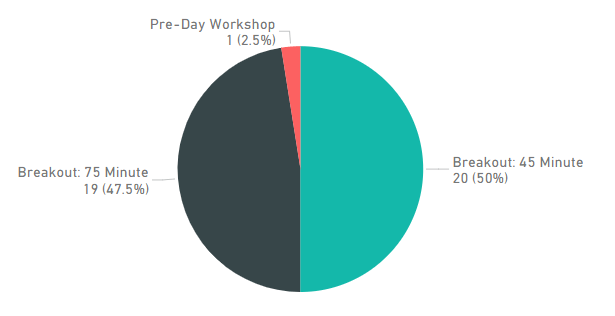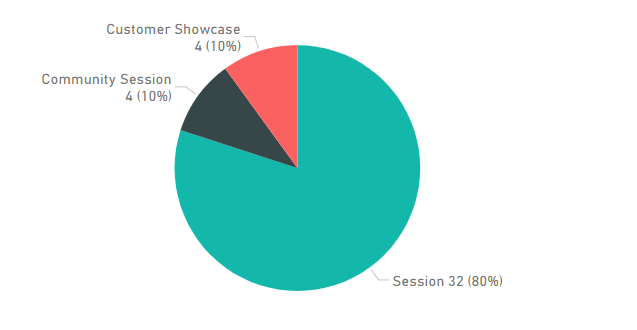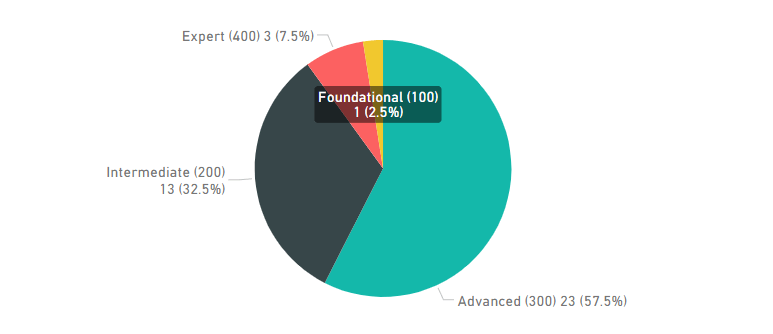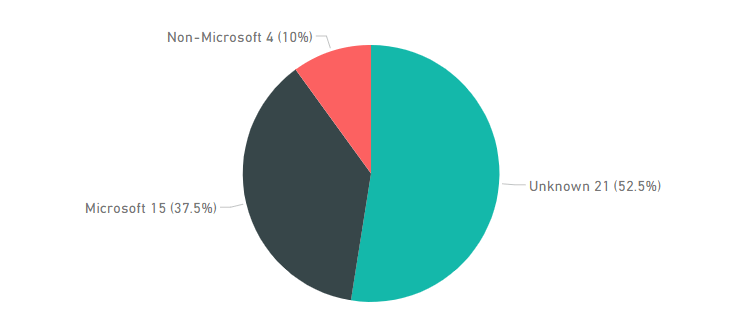Reading the runes – what does the Ignite 2018 Session Catalog tell us about Skype for Business & Microsoft Teams
It’s always fun to speculate on the future, as long as that’s all it is. I wondered whether it was possible to look at the newly released Session Catalog for Microsoft Ignite 2018, and see if the sessions which have been chosen indicate anything we didn’t already know about Skype for Business and Teams.
All the information below is taken from the Session Catalog and was correct as of 12th August 2018. It’s worth noting though that the Catalog is likely to change and evolve leading up to the start of the conference.
There are currently 629 sessions in total at Ignite this year.
There are 6 sessions with the word ‘Skype’ in the title.
There are 40 sessions with the word ‘Teams’ in the title. (note though, that Teams is an overloaded word)
Skype Sessions
Let’s look in detail at those Skype sessions:
- BRK3113: Deep dive into the Modern Administration Portal for Microsoft Teams and Skype for Business
- BRK2190: Delighting your End Users: Facilitating a smooth transition from Skype for Business to Teams
- BRK3141: Designing your path from Skype for Business to Teams: Start Here!
- BRK3229: Everything you need to know about Skype for Busines Server
- BRK3230: Learn how Microsoft does IT: The journey from Skype for Business to Teams
- BRK3142: Planning a seamless migration from Skype for Business to Teams for IT Admins
So, there’s a session on the Modern Administration Portal, which looks like it’s going to become a single place to administer both Teams and Skype for Business, which is good.
We already knew that there would be a new version of Skype for Business Server, so it’s good to see it has a session. The title of the session suggests that it will cover “everything you need to know”, which is good, as it’s the only session I could find on it!
The remaining 4 sessions are all focused on the transition from Skype for Business to Teams. If you needed any more proof of Microsoft’s current direction of travel, I’m just going to leave that fact here. 🙂
Teams Sessions
Now, let’s look at the Teams sessions. Because 40 sessions is quite a lot to look at in one go, I’ve split them into these categories:
General Teams
- BRK2159: What’s new in Microsoft Teams: the hub for teamwork
- BRK2188: Intelligent meetings in Microsoft Teams
- BRK2285: Building a community-led tech conference using Microsoft Teams
- BRK3231: Collaboration on the Go with the Microsoft Teams Mobile App
- BRK3370: Innovation of Microsoft Teams built on a foundation of quality
- BRK3168: Intelligent communications across devices in Microsoft Teams
- BRK3232: Collaborative calling and business voice in Microsoft Teams
- BRK2287: Making Microsoft Teams work without understanding Information Architecture
Transition to Teams
- BRK2190: Delighting your End Users: Facilitating a smooth transition from Skype for Business to Teams
- BRK3141: Designing your path from Skype for Business to Teams: Start Here!
- BRK3170: Driving Teams adoption: Enabling the modern workplace with Office 365 and Microsoft Teams
- BRK3230: Learn how Microsoft does IT: The journey from Skype for Business to Teams
- BRK3142: Planning a seamless migration from Skype for Business to Teams for IT Admins
Strategy / User Adoption
- PRE05: Making teamwork more productive: Plan your organization’s teamwork and collaboration strategy using Microsoft Teams and other Microsoft 365 solutions
- BRK2160: The time for Teams: Scenarios to realize the value of Microsoft Teams
- BRK2169: Driving employee engagement with Teams Live Events
- BRK3276: Using bots to aid the adoption of Microsoft Teams
Deploying Teams
- BRK2189: Success with Teams Customer Panel Best practices for large scale enterprise deployments
- BRK3125: Deploying and Managing Microsoft Teams Certified Devices
- BRK3122: Connecting Microsoft Teams to third-party meeting room devices with Cloud Video Interop
Managing Teams
- BRK3113: Deep dive into the Modern Administration Portal for Microsoft Teams and Skype for Business
- BRK4012: How to manage Microsoft Teams effectively
- BRK3136: How to manage secure: custom applications in Microsoft Teams
- BRK4013: Quality in meetings and calling in Microsoft Teams deep dive
- BRK3278: Running a tight ship: Controlling Microsoft Teams
- BRK3120: Troubleshooting Microsoft Teams
- BRK3138: Managing Client Deployments and Updates for Microsoft Teams
Under the Hood
- BRK3118: Microsoft Teams architecture update
- BRK4016: Understanding Media Flows in Microsoft Teams
- BRK3169: Understanding calling usage and diagnosing call failures in Microsoft Teams
Extension & Development
- BRK2118: Adaptive Cards in Teams: Windows: Outlook and your own applications
- BRK3119: Deep dive into building apps for Microsoft Teams
- BRK3171: Drive Digital Transformation through Apps in Microsoft Teams
Vertical-Specific
- BRK1055: Enabling Firstline Workers with Microsoft Teams
- BRK2143: Improving Health Team Collaboration using Microsoft Teams
- BRK2056: Microsoft Dynamics 365 for Sales: Transforming sales collaboration with Microsoft Teams
- BRK2296: Microsoft Teams + OneNote + Forms + Flipgrid = Student achievement
- BRK3140: Microsoft Teams in the government cloud
- BRK3126: What’s new in EDU? Updates to Microsoft Teams in Office 365 Education
Nothing to do with Teams
- BRK3198: Top tips for Git powered teams
We’ve picked up another transitioning session in this list. There’s a good variance of different focus areas with hopefully something for everyone. There’s a bit more of a focus on management of Teams and on the different vertical-specific applications of teams than on, say, development, but that probably speaks to where Teams is today as a solution. Also, I was surprised not to see more sessions on user adoption as this is a really important part of succeeding with Teams. In fairness though, lots of user adoption stuff is probably also covered in the Transition sessions.
What sort of Sessions can you expect?
Looking at the total 41 sessions (both Skype and Teams, ignoring the one about Git), the breakdown is as follows:
Session Types

Session Formats

Solution Focus

Session Levels

Speakers

For those of you wondering where this data came from, I’ll be doing a blog post later in the week, so look out for that.










